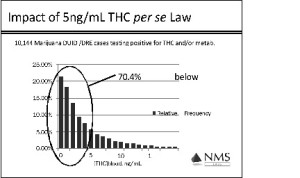The following was delivered to Illinois Governor Rauner’s office Tuesday, May 26, 2015:
We ask you to exercise your line item veto authority when signing HB 218, Cannabis Penalties. This bill, drafted to decriminalize marijuana, also eliminates Illinois’ ability to successfully prosecute drivers under the influence of marijuana by creating the nation’s first 15 ng/ml Δ9 THC per se law. We ask that you strike the per se provision when signing the bill into law.
The 15 ng per se limit in whole blood, the nation’s highest, was passed by a legislature that was misled by the bill’s sponsors into believing the level is a compromise between Washington’s 25 ng limit and Colorado’s 5 ng limit, is scientifically sound and is based upon federal research. All of these claims are false
Washington’s per se limit is 5 ng (RCW 46.61.502). There is no level of THC in blood above which everyone is impaired, and below which no one is impaired. Impairment begins at 1-2 ng/ml in blood according to NHTSA-sponsored research[1], but not for everyone, which is the problem. Federal researchers refused to support Colorado’s 5 ng limit when it was proposed, and there is no federal research supporting a level higher than that.
Data from Colorado’s laboratories and the Colorado State Patrol demonstrate that between 55% and 70% of drivers arrested on suspicion of driving under the influence of marijuana who actually test positive for cannabinoids, test below 5 ng/ml THC in blood. Those drivers are consequently not prosecuted; regardless of any victims they may leave in their wake.
NMS Labs[2] published the following data from nationwide testing showing that 70.4% of cannabinoid positive drivers tested below 5 ng/ml, and an estimated 98% test below 15 ng/ml.
A 15 ng limit may exonerate marijuana daily users from unwarranted DUI prosecution, but it prevents DUI prosecution for occasional and recreational users of marijuana who drive while impaired. The purpose of a per se law should be to protect public safety, not to shelter a minority of addicts.
Although bill supporters (and the Chicago Tribune) claim that impaired drivers testing below 15 ng/ml can still be prosecuted successfully under Illinois’ impairment statute, they are unable to square that statement with the prosecution history of drunk drivers testing below .08 BAC.
We respectfully request that you consider DUID victims as you consider HB 218, and strike the 15 ng/ml THC per se limit prior to signing the bill into law.
[1] Ramaekers, et al., Cognition and motor control as a function of Δ9 THC concentration in serum and oral fluid: Limits of impairment. Drug and Alcohol Dependence 85 (2006) 114-122; doi:10.1016/j.drugalcdep.2006.03.015
[2] NMS Labs, 3701 Welsh Rd, Willow Grove, PA, Barry Logan, VP of Forensic Science Initiatives

